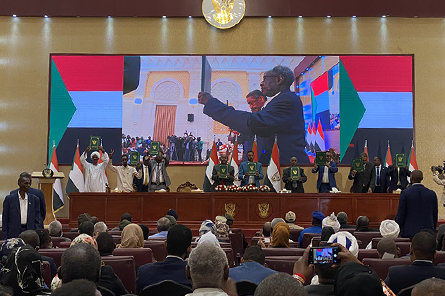Sudan
Following the 5 December 2022 signing of the Political Framework Agreement aimed at restoring a civilian-led transition in Sudan, DCAF was requested to support dialogue among national stakeholders on security sector governance and reform (SSG/R) and related aspects of transitional justice with the aim of demystifying key principles and approaches of these processes and mapping realistic entry points for reform. As part of its support, DCAF will develop a series of policy papers and organize roundtable discussions with key stakeholders from civilian groups, the security sector, civil society and academia, and deploy experts to specific technical initiatives so as to mentor, coach or advise national stakeholders as needed.
Whilst the Political Framework Agreement presents a generational opportunity for reform, it will be critical in the short term to foster greater, shared understanding among Sudanese stakeholders of what SSG/R entails so that they can engage in informed policy dialogue on the future of the security sector, with the ultimate goal of effective and accountable security provision within a framework of democratic governance, the rule of law and respect for human rights.

Workstreams/Projects
This policy paper highlights the following lessons from SSR processes in the context of military-to-civilian transitions:
- The importance of local ownership of and political commitment to reform;
- Setting realistic and affordable timelines for reform;
- Properly planning the reform process;
- Getting the sequencing of the reform process right;
- Characteristics of (un)successful integration of security forces;
- Dealing with past abuses.
Download "Building the Foundations and Start of Transition Processes in the Security Sector" policy paper or its summary
- in English: policy brief / summary
- in Arabic: policy brief / summary
This policy paper "Security Sector Governance in Transition: Civilian Oversight of the Security Sector" highlights the following lessons with regard to establishing civilian oversight of the security sector:
- Demystify what civilian control and civilian oversight entail, outline their benefits and limitations;
- Ensure civilian control is embedded in the legal framework;
- Knowledge and understanding of security sector governance is critical;
- Ensure that oversight and policy decisions are evidence-based and informed by analysis and data;
- Balance oversight/accountability with constructive support of security institutions;
- Ensure coordination and coherence between civilian actors;
- Build a system of oversight, not just a single set of actors;
- Manage the risks of politicization of the security sector.
Download the policy paper "Security Sector Governance in Transition: Civilian Oversight of the Security Sector" in English or in Arabic.
Contacts
Anne Bennet, Head of Division, Sub-Saharan Africa Division (a.bennett@dcaf.ch)
Alexander Burian, Principal Programme Manager, Sub-Saharan Africa Division (a.burian@dcaf.ch)